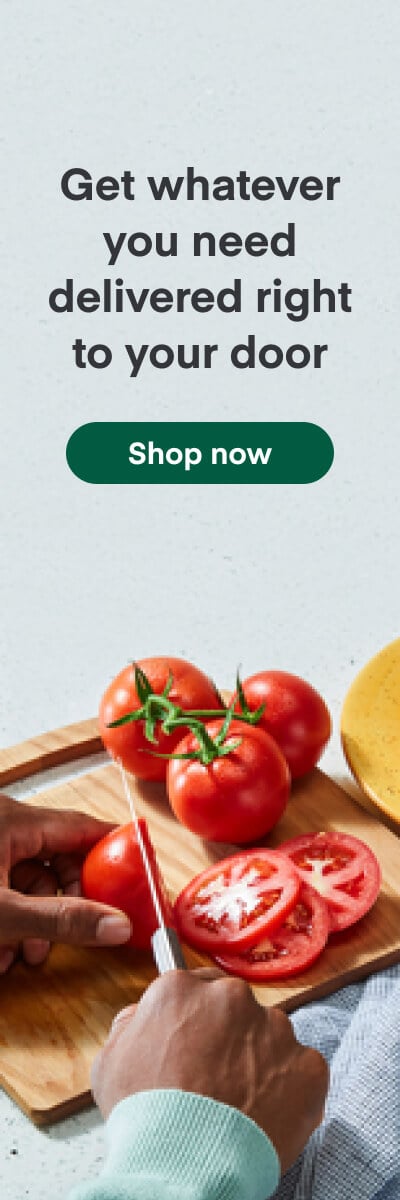Company Updates
Introducing Connected Stores: Making Shopping Seamless
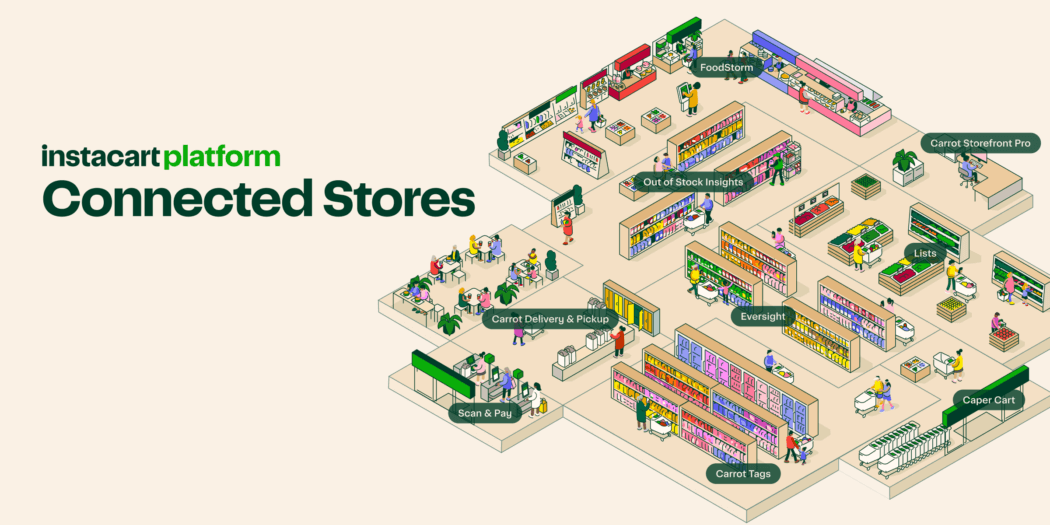
For the last decade, we’ve worked with grocers to bring their businesses online, and helped people find their favorite foods and get them delivered to their door in just a few clicks. While there’s a lot to love about online shopping, there will always be something special about walking into a physical grocery store, browsing the aisles, getting inspired to try new products, or even bumping into neighbors by the cheese counter.
It made us think: what if we could combine the convenience, speed and personalization of online grocery shopping with the inspiration and discovery that happens in a physical store?
We believe the future of grocery won’t be about choosing between shopping online and in-store. Most of us are going to do both. So we want to bring the best of the online shopping experience to physical stores, and vice versa.
That’s why today we’re excited to announce Connected Stores — a bundle of new and existing Instacart Platform technologies that will help grocers build a unified, seamless, personalized experience both online and in-store. At the heart of the Connected Stores experience is the idea that we won’t just help retailers build their websites and apps, we’ll also connect all of our e-commerce solutions – like Storefront Pro – with new in-store technologies, offering consumers the best of both worlds.
Connected Stores includes:
- The new Caper Cart
- Scan & Pay
- Lists
- Carrot Tags
- FoodStorm Department Orders
- Out of Stock Insights
All of these technologies work seamlessly together, meaning that retailers don’t have to piece together point solutions from different vendors. They’re also modular, and support existing hardware solutions, so retailers don’t have to install dozens of expensive cameras or spend millions of dollars retrofitting their stores.
We’ve been piloting each of these technologies with select retailers, and today we’re opening them up to retailers across the U.S. and Canada. Together, they’re designed to do a few key things:
More magic, fewer lines.
Today, we’re introducing the newest model of our Caper Cart — an AI-powered smart cart equipped with scales, sensors, touchscreens, and computer vision technology. The screen helps you navigate the store, and unlike self-checkout terminals and other smart carts, our proprietary scanless technology means you don’t have to manually scan items. Just drop them in the cart and we’ll check them off your list. You can bag as you go, and check out right from the cart.
The new Caper Cart is slimmer, lighter, and holds 65% more than the previous version, and will be rolling through the aisles of retailers like Wakefern Food Corp. in the coming months. It’s the only smart cart on the market to offer stacked charging, meaning grocers don’t have to charge carts individually or swap out batteries. And because Caper Carts can be upgraded over the air, they’ll keep getting better.
In addition to Caper Carts, we’re also introducing Scan & Pay, which lets you scan items as you shop and pay for them using your mobile phone. Scan & Pay also links the items you buy in-store to your online account, so it’s easier to buy them again. And if you’re an EBT SNAP user, we’ll let you know which items are EBT SNAP-eligible as soon as you scan them, making it easier for you to explore the store and find approved products.
A more personalized experience
If you use Instacart, you probably have an online shopping list and an offline shopping list for when you visit the store. Why not combine them?
With Lists, we’re making it easy to use your online list when you’re shopping in person. Just walk into the store and sync your shopping list from the Instacart App or your grocer’s Instacart-powered app directly to a Caper Cart by scanning a QR code. The Caper Cart will help you find the items you’re looking for, and check them off automatically when you place them in the cart. And if you use Caper or Scan & Pay, the products you bought in-store become part of your online lists and can be repurchased online on Instacart or on retailers’ Instacart-powered websites.
Find what you need and discover what’s new
In a grocery store, technology can make it easier to find what you’re looking for, learn more about the products you buy, and order from the bakery, butcher, or deli while you shop for everything else on your list.
Unable to find a grocery store employee so you can ask where something is? Carrot Tags connect with electronic shelf labels to make finding products and learning about new ones easier than ever before. Carrot Tags have pick-to-light capabilities, meaning that customers, store associates, or Instacart shoppers can select an item on their phone and the corresponding shelf label will flash — like magic. Schnucks will be using Carrot Tags to help shoppers find items on the shelves more easily.
Carrot Tags can also display information, like whether a specific product is gluten-free, organic, or kosher. And you can learn more about an item — including whether it’s eligible for SNAP — or save a recipe to your online profile by scanning a QR code on the electronic shelf label.
Besides finding the items you’re looking for on a shelf, we also want to make it easier to order things like baked goods, hot items, and deli sandwiches while you shop. No more waiting in line at the counter. This is good for retailers, too, since fresh, custom items and prepared foods also tend to drive high margins.
We already help grocers bring all of their paper tickets online through FoodStorm, our catering and meals software that runs on in-store kiosks. Today, we’re taking it a step further with the launch of Department Orders, which allow different departments within a store to collaborate.
Now, you’ll be able to order a cake from the bakery and a sandwich from the deli and have them both ready at the same time. You’ll also be able to order custom items like a sandwich or a pizza while you shop and pick them up in minutes. It’s easier for you, and easier for retailers who can fulfill orders more efficiently. For example, if you’re visiting family-owned Italian specialty market Joseph’s Classic Market — a local Florida favorite — you will be able to custom order your sandwich while shopping for fresh produce for tonight’s dinner.
More efficient in-store operations for grocers
Some of these technologies can also help grocers drive efficiencies in their operations, and we have unique data that can help. For example, grocers spend a lot of time and energy making sure their shelves are stocked. What if we could simplify that process? Until now, we’ve shared data from our shoppers with retailers on a daily basis to let them know which items need to be replenished. Now with Out of Stock Insights, the same information will be available to retailers in real time so they can alert associates as soon as an item is running low or out of stock. For retailers, it means missing out on fewer sales. For customers, it means a better chance of finding exactly what you need when you need it.
Building Connected Stores
So what will it look like when all the pieces of Connected Stores come together?
Today, we’re excited to announce the launch of our first Connected Store with Good Food Holdings.
In the coming months, you’ll be able to see our Connected Stores technology — including Caper Carts, Scan & Pay, Lists, Carrot Tags, and FoodStorm software — in action at their Bristol Farms store in Irvine, California. Good Food Holdings will also be using Storefront Pro to power Bristol Farms’ online store, connect it to their physical store, and create a better experience across both.
For customers, a Connected Store will mean a better grocery shopping experience — with fewer headaches and more inspiration, whether online or in person. For retailers, it will mean more efficiency, eliminating repetitive tasks so employees can focus on things like customer service, and higher profits, since customers who shop online and in-person are more engaged and spend more.
It’s just one of the ways we’re working with retailers to help power the future of grocery — both online and in-store — and bring a little magic to your grocery shopping experience.
Most Recent in Company Updates

Company Updates
Classroom Carts: Supporting LA Schools Impacted by Wildfires
The recent wildfires in Los Angeles have had a devastating impact on the community – displacing families, closing schools, and forcing students and teachers to rely on remote learning. In the midst of the crisis…
Feb 19, 2025
Company Updates
Tackling Food Deserts in Columbia, SC: First Year Success and Program Expansion Plans
Many people across the country continue to face challenges accessing food because they live in food deserts – areas where affordable food options, including fresh fruits and vegetables, are hard to find. But we have…
Feb 3, 2025
Company Updates
Instacart Celebrates Its First-Ever Big Game Ad with Free Snacks with Your Order, Deals & Surprise Deliveries
Fans can get in on the action with a week of game day deals, free snacks with your order, and even a chance to get their Big Game Instacart order delivered by beloved grocery brand…
Jan 30, 2025

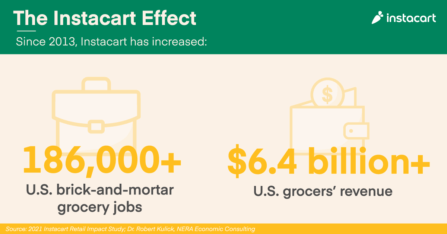 Instacart’s Impact on America’s Grocery Industry, by the Numbers
Instacart’s Impact on America’s Grocery Industry, by the Numbers 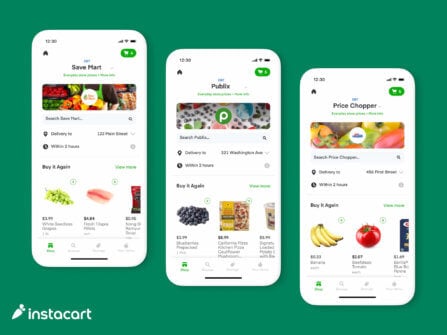 Breaking Down Barriers to Food Access with EBT SNAP Expansion
Breaking Down Barriers to Food Access with EBT SNAP Expansion  Beyond the Cart: A Year of Essential Stories
Beyond the Cart: A Year of Essential Stories 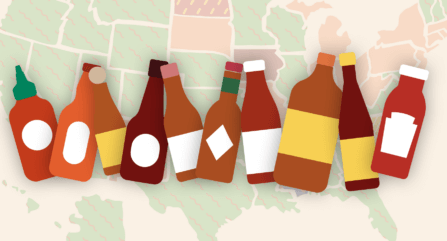 A Hot Take on America’s Favorite Hot Sauces 🌶
A Hot Take on America’s Favorite Hot Sauces 🌶 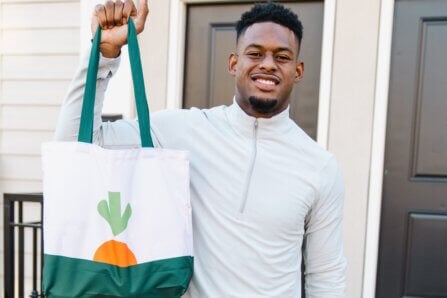 JuJu Smith-Schuster: What’s in my Cart?
JuJu Smith-Schuster: What’s in my Cart? 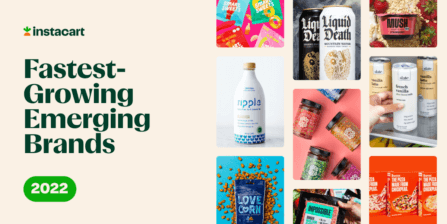 Introducing the First-Ever Instacart Emerging Brand List
Introducing the First-Ever Instacart Emerging Brand List 